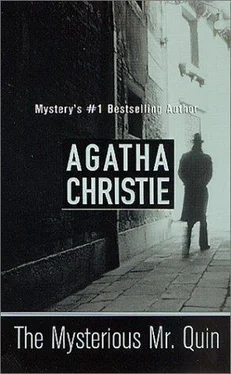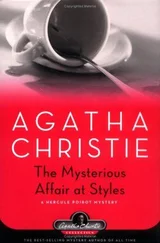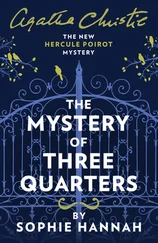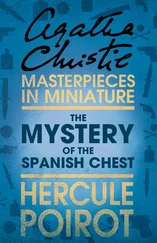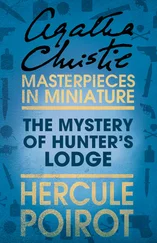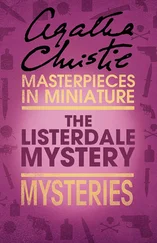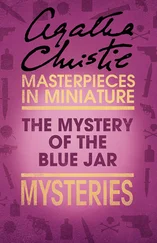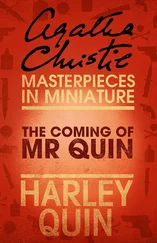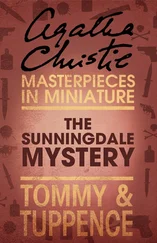Agatha Christie - The Mysterious Mr. Quin
Здесь есть возможность читать онлайн «Agatha Christie - The Mysterious Mr. Quin» — ознакомительный отрывок электронной книги совершенно бесплатно, а после прочтения отрывка купить полную версию. В некоторых случаях можно слушать аудио, скачать через торрент в формате fb2 и присутствует краткое содержание. Жанр: Классический детектив, на английском языке. Описание произведения, (предисловие) а так же отзывы посетителей доступны на портале библиотеки ЛибКат.
- Название:The Mysterious Mr. Quin
- Автор:
- Жанр:
- Год:неизвестен
- ISBN:нет данных
- Рейтинг книги:4 / 5. Голосов: 1
-
Избранное:Добавить в избранное
- Отзывы:
-
Ваша оценка:
- 80
- 1
- 2
- 3
- 4
- 5
The Mysterious Mr. Quin: краткое содержание, описание и аннотация
Предлагаем к чтению аннотацию, описание, краткое содержание или предисловие (зависит от того, что написал сам автор книги «The Mysterious Mr. Quin»). Если вы не нашли необходимую информацию о книге — напишите в комментариях, мы постараемся отыскать её.
The Mysterious Mr. Quin — читать онлайн ознакомительный отрывок
Ниже представлен текст книги, разбитый по страницам. Система сохранения места последней прочитанной страницы, позволяет с удобством читать онлайн бесплатно книгу «The Mysterious Mr. Quin», без необходимости каждый раз заново искать на чём Вы остановились. Поставьте закладку, и сможете в любой момент перейти на страницу, на которой закончили чтение.
Интервал:
Закладка:
"She was a Radzynski," he explained Franklin Rudge. "One of the oldest families in Hungary. She's had the most extraordinary life. You know that great rope of pearls she wears?"
Mr. Satterthwaite nodded.
"That was given her by the King of Bosnia. She smuggled some secret papers out of the kingdom for him."
"I heard," said Mr. Satterthwaite, "that the pearls had been given her by the King of Bosnia."
The fact was indeed a matter of common gossip, it being reported that the lady had been a cher amie of His Majesty's in days gone by.
"Now I'll tell you something more." Mr. Satterthwaite listened, and the more he listened the more he admired the fertile imagination of the Countess Czarnova. No vulgar "siren stuff"(as Elizabeth Martin had put it) for her. The young man was shrewd enough in that way, dean living and idealistic. No, the Countess moved austerely through a labyrinth of diplomatic intrigues. She had enemies, detractors―naturally! It was a glimpse, so the young American was made to feel, into the life of the old regime with the Countess as the central figure, aloof, aristocratic, the friend of counsellors and princes, a figure to inspire romantic devotion.
"And she's had any amount to contend against," he ended the young man warmly. "It's an extraordinary thing but she's never found a woman who would be a real friend to her. Women have been against her all her life."
"Probably," said Mr. Satterthwaite.
"Don't you call it a scandalous thing?" demanded Rudge hotly.
"N―no," said Mr. Satterthwaite thoughtfully. "I don't know that I do. Women have got their own standards, you know. It's no good our mixing ourselves up in their affairs. They must run their own show."
"I don't agree with you," said Rudge earnestly. "It's one of the worst things in the world to-day, the unkindness of woman to woman. You know Elizabeth Martin? Now she agrees with me in theory absolutely. We've often discussed it together. She's only a kid, but her ideas are all right. But the moment it comes to a practical test―why, she's as bad as any of them. Got a real down on the Countess without knowing a darned thing about her, and won't listen when I try to tell her things. It's all wrong, Mr. Satterthwaite. I believe in democracy―and―what's that but brotherhood between men and sisterhood between women?"
He paused earnestly. Mr. Satterthwaite tried to think of any circumstances in which a sisterly feeling might arise between the Countess and Elizabeth Martin and failed.
"Now the Countess, on the other hand, "went on Rudge," admires Elizabeth immensely, and thinks her charming in every way. Now what does that show?"
"It shows," said Mr. Satterthwaite dryly, "that the Countess has lived a considerable time longer than Miss Martin has."
Franklin Rudge went off unexpectedly at a tangent.
"Do you know how old she is? She told me. Rather sporting of her. I should have guessed her to be twenty-nine, but she told me of her own accord that she was thirty-five. She doesn't look it, docs she?"
Mr. Satterthwaite, whose private estimate of the lady's age was between forty-five and forty-nine, merely raised his eyebrows.
"I should caution you against believing all you are told at Monte Carlo," he murmured.
He had enough experience to know the futility of arguing with the lad. Franklin Rudge was at a pitch of white hot chivalry when he would have disbelieved any statement that was not backed with authoritative proof.
"here is the Countess," said the boy, rising.
She came up to them with the languid grace that so became her. Presently they all three sat down together. She was very charming to Mr. Satterthwaite, but in rather an aloof manner. She deferred to him prettily, asking his opinion, and treating him as an authority on the Riviera.
The whole thing was cleverly managed. Very few minutes had elapsed before Franklin Rudge found himself gracefully but unmistakably dismissed, and the Countess and Mr. Satterthwaite were left tete-a-tete.
She put down her parasol and began drawing patterns with it in the dust
"You are interested in that nice American boy, Mr. Satterthwaite, are you not?"
Her voice was low with a caressing note in it.
"He's a nice young fellow," said Mr. Satterthwaite, non-committally.
"I find him sympathetic, yes," said the Countess reflectively. "I have told him much of my life."
"Indeed," said Mr. Satterthwaite.
"Details such as I have told to few others," she continued dreamily. "I have had an extraordinary life, Mr. Satterthwaite. Few would credit the amazing things that have happened to me."
Mr. Satterthwaite was shrewd enough to penetrate her meaning. After all, the stories that she had told to Franklin Rudge might be the truth. It was extremely unlikely, and in the last degree improbable, but it was possible.... No one could definitely say―"That is not so―――"
He did not reply, and the Countess continued to look out dreamily across the bay.
And suddenly Mr. Satterthwaite had a strange and new impression of her. He saw her no longer as a harpy, but as a desperate creature at bay, fighting tooth and nail. He stole a sideways glance at her. The parasol was down, he could see the little haggard lines at the corners of her eyes. In one temple a pulse was beating.
It flowed through him again and again―that Increasing certitude. She was a creature desperate and driven. She would be merciless to him or to anyone who stood between her and Franklin Rudge, But he still felt he hadn't got the hang of the situation. Clearly she had plenty of money. She was always beautifully dressed, and her jewels were marvellous. There could be no real urgency of that kind. Was it love? Women of her age did, he well knew, fall in love with boys. It might be that. There was, he felt sure, something out of the common about the situation.
Her tete-a-tete with him was, he recognised, a throwing down of the gauntlet. She had singled him out as her chief enemy. He felt sure that she hoped to goad him into speaking slightingly of her to Franklin Rudge. Mr. Satterthwaite smiled to himself. He was too old a bird for that. He knew when it was wise to hold one's tongue.
He watched her that night in the Cercle Prive, as she tried her fortunes at roulette.
Again and again she staked, only to see her stake swept away. She bore her losses well, with the stoical sang froid , of the old habitue. She staked en plein once or twice, put the maximum on red, won a little on the middle dozen and then lost It again, finally she backed manque six times and lost every time. Then with a little graceful shrug of the shoulders she turned away.
She was looking unusually striking in a dress of gold tissue with an underlying note of green. The famous Bosnian pearls were looped round her neck and long pearl earrings hung from her ears.
Mr. Satterthwaite heard two men near him appraise her.
"The Czarnova," said one, "she wears well, does she not? The Crown jewels of Bosnia look fine on her."
The other, a small Jewish-looking man, stared curiously after her.
"So those are the pearls of Bosnia, are they?" he asked." En verite. That is odd."
He chuckled softly to himself.
Mr. Satterthwaite missed hearing more, for at the moment he turned his head and was overjoyed to recognise an old friend.
"My dear Mr. Quin." He shook him warmly by the hand. "The last place I should ever have dreamed of seeing you."
Mr. Quin smiled, his dark attractive face lighting up.
"It should not surprise you," he said. "It is Carnival time. I am often here in Carnival time."
"Really? Well, this is a great pleasure. Are you anxious to remain in the rooms? I find them rather warm."
"It will be pleasanter outside, agreed the other. "We will walk in the gardens."
The air outside was sharp, but not chill. Both men drew deep breaths.
Читать дальшеИнтервал:
Закладка:
Похожие книги на «The Mysterious Mr. Quin»
Представляем Вашему вниманию похожие книги на «The Mysterious Mr. Quin» списком для выбора. Мы отобрали схожую по названию и смыслу литературу в надежде предоставить читателям больше вариантов отыскать новые, интересные, ещё непрочитанные произведения.
Обсуждение, отзывы о книге «The Mysterious Mr. Quin» и просто собственные мнения читателей. Оставьте ваши комментарии, напишите, что Вы думаете о произведении, его смысле или главных героях. Укажите что конкретно понравилось, а что нет, и почему Вы так считаете.
